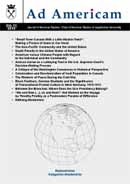The Rhetoric of Peace during the Cold War
The Rhetoric of Peace during the Cold War
Author(s): Marta RzepeckaSubject(s): Politics / Political Sciences
Published by: KSIĘGARNIA AKADEMICKA Sp. z o.o.
Summary/Abstract: In the 1970s, the United States and the Soviet Union launched a new course in their contact, called ‘détente’. One of the main reasons for this remarkable turnabout was a radical change of views of the two countries’ leaders. President Nixon and General Secretary Brezhnev openly expressed their readiness and willingness to overcome ideological barriers to build and keep permanent peace. The aim of this paper is to illustrate the two leaders’ views by analysing two speeches, one made by Nixon during his visit to the Soviet Union in 1972 and the other made by Brezhnev during his stay in the United States in 1973. Examination of their rhetorical strategies – such as choice of words, arguments, and emphasis – will reveal how Nixon and Brezhnev understood peace and how they aimed to achieve it. Confronting the two leaders’ goals with the actual outcomes of their actions, and taking the significance of political changes as a yardstick of fulfilled declarations, it can be demonstrated whether Nixon and Brezhnev truly desired to achieve enduring peace or whether they used peace rhetoric as a tool to weaken each other’s vigilance and take the lead in the Cold War race.
Journal: Ad Americam. Journal of American Studies
- Issue Year: 2010
- Issue No: 11
- Page Range: 99-106
- Page Count: 8
- Language: English

